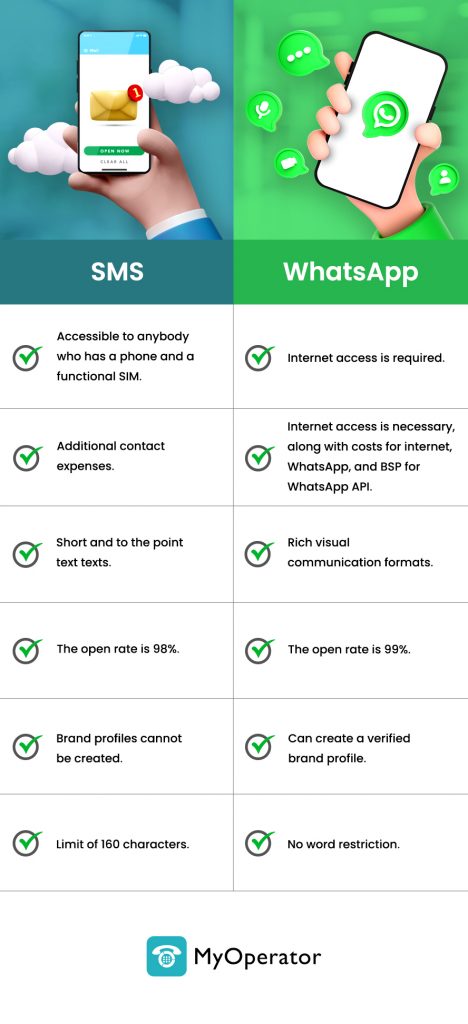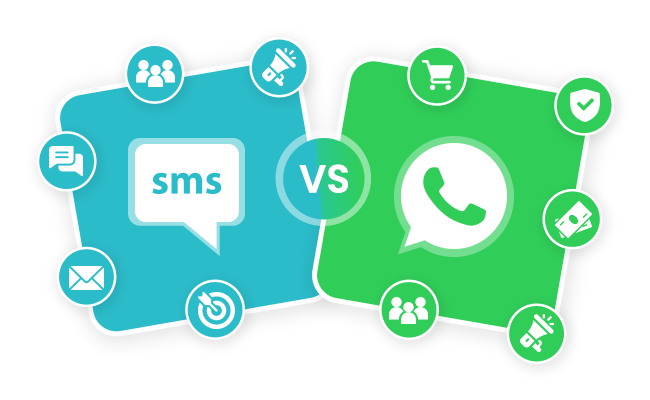Table of Content
Let’s picture this: a battle between two communication giants – SMS and WhatsApp. It’s a showdown that has been brewing for decades. SMS is presently outperformed by WhatsApp in terms of price, user preference, and utility. WhatsApp’s ability to share messages with multimedia content, including images, videos, documents, and locations, is its best feature.
SMS is still a useful marketing tool for companies even though it has lost ground in terms of personal contact.
While you might think texting is a modern phenomenon, it’s actually over a century younger than phone calls! That’s right, for 116 long years, the only way people could talk to each other was over the phone. Until one day in 1992, when a brave soul named Neil Papworth sent his colleague the first ever text message: “Merry Christmas.”
Messaging is incredibly simple. It’s an all-encompassing activity that can be done while doing practically anything, from exercising to eating. Why bother with phone calls when you can simply shoot off a quick message on WhatsApp or SMS?
But fast forward to today, and we have come a long way since those humble beginnings. With the rise of smartphones and the internet, customers have been ditching SMS and flocking to WhatsApp in droves. And it’s not hard to see why.
The business world has been completely changed by SMS marketing’s transformative power, which has enabled businesses to experience success like never before. SMS marketing has permanently changed the industry by influencing persuading and sales, rewarding loyalty, and offering top-notch services.
However, as the winds of change sweep through the digital landscape, messaging apps like WhatsApp have emerged as a formidable competitor. With the ability to share multimedia, links, and even make purchases, WhatsApp has captured the attention of millions.
The key difference between SMS and WhatsApp marketing lies in their transmission methods: SMS utilizes cellular networks and carriers, while WhatsApp requires an internet connection to exchange messages. As this dynamic transition takes place, it is likely to forever alter the future of marketing.
Time to dive deeper and explore: SMS vs WhatsApp Marketing
It’s always best to start with the benefits, shall we?
Advantages of WhatsApp
- The application downloads quickly.
- You can change your bio and profile photo so that your contacts know who they are interacting with.
- It is completely free to download and send/receive texts.
- WhatsApp features the ability to share multiple images, files, audio files, documents, and many more.
- You can find out if the recipient of the communication has received and read it. Whether you have allowed read receipts for your account or not will determine this.
- If you want to know when an individual was last active, you can simply find out their last active hours.
Advantages of SMS marketing
- It could be viewed as superior to emailing. Since emails frequently contain lengthy material, not all emails must be concise. which may result in the consumer losing interest.
- Due to the fact that almost everyone has a phone, sending a Text to someone is simple. They can be told about the new deal, package, reduction, etc. You can evaluate interest by including a website for them to click on.
- Sending content via SMS is simple if you are operating in a nation where data is costly or Wi-fi is less prevalent.
- It enables you to deliver offers to clients promptly, allowing them to take advantage of them right away. You can participate in real-time interaction.
Now, the age-old question for businesses – which marketing channel reigns supreme? It’s time to settle the debate once and for all by pitting two powerhouses against each other: SMS and WhatsApp. So, hold on tight as we take a leap into the world of messaging apps and discover which one comes out on top for your business.
SMS vs. WhatsApp Marketing: List of a few important factors to consider for your decision-making process
1. Consent
No matter which communication channel you use – be it messenger or SMS – you must always ensure that you have your client’s consent. This is non-negotiable!
WhatsApp offers a highly customised and interactive experience as a messaging app created especially for businesses to engage with their customers. One of its most significant benefits is that customers must provide explicit permission to receive messages from businesses on the app. This helps ensure that customers only receive messages they’re interested in and don’t feel bombarded with irrelevant content. Additionally, businesses can use WhatsApp’s opt-in feature to make it easy for customers to give their consent to receive messages, ensuring that the communication is transparent and legal.
On the other side, there is SMS. Although SMS is a popular communication method with a high open rate, it’s crucial to keep in mind that consumers must give their consent before companies can send them messages. This can be a little trickier since companies have to make sure that customers know what they are signing up for and that they are voluntarily giving their consent. Once customers have given their consent, companies can however send messages that are highly relevant and targeted, assisting in the development of a strong customer base.
2. Reach
With over 2 billion active users worldwide, WhatsApp is a force to be reckoned with. It’s a messaging app that’s designed specifically for businesses to interact with their customers, and its tons of features make communication much easier. One of its biggest advantages is its reachability – it’s almost guaranteed that your message will reach your customers in real-time, no matter where they are in the world. Whether it’s a quick response to a customer inquiry or a promotional message to your loyal followers, WhatsApp Business API (Solution) provides a fast and reliable way to connect with your audience.
On the other hand, we have SMS. This classic communication channel has been around for decades and has proven to be a tried-and-true method for reaching customers. SMS has a 98% open rate, which means that almost all messages are read by the recipient. This makes it a highly effective way to ensure your message gets across to your customers. Furthermore, SMS is widely available, and nearly everyone with a mobile phone can receive and respond to messages.
So, which one wins when it comes to reachability? Well, it’s a tough call. While SMS has a high open rate, WhatsApp for business API (Solution) provides a more immediate and interactive experience.

3. Media Usage
It is believed that conversational marketing, or marketing interactions between a business and its customers, has a bright future. However, WhatsApp is not necessary for that. There are many options, and you can also communicate with your clients via SMS if you have an inbound toll free number. without time restrictions or pre-made formats. Certainly, you can’t send images via SMS, but you can send URLs. Instead of relying solely on a single image to persuade your customer, create an excellent landing website. The customer’s experience during the discussion is always more significant than the channel through which it occurs in the end.
Well, as it turns out, there is no one-size-fits-all answer to this question. The ideal marketing channel for your business depends on your unique needs and your target audience’s preferences. Are you looking to quickly reach a broad audience with a short, crisp message? Then SMS marketing might be your go-to. But if you want to provide more in-depth information and foster a more interactive relationship with your customers, WhatsApp marketing could be the perfect fit.
When you can have the best of both worlds, why pick one over the other? By strategically combining SMS and WhatsApp marketing, you can create a dynamic and comprehensive marketing strategy that caters to different customer preferences and engages them where they are most comfortable. After all, in the fast-paced world of business, it pays to stay flexible and versatile. So, why not try out both channels and see how they can work together with the support of Myoperator as your IVR services provider, to take your business to new heights?


